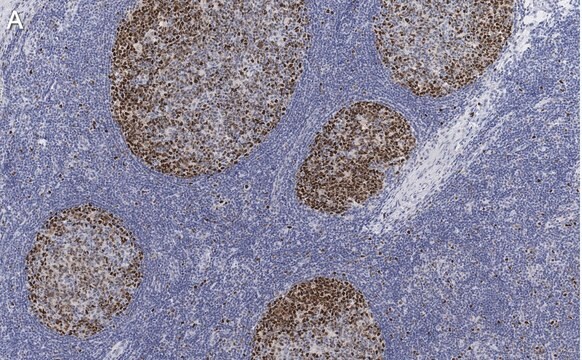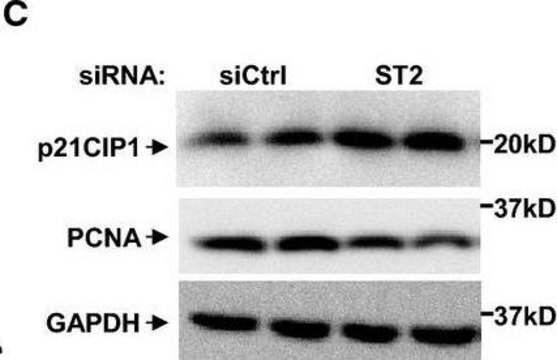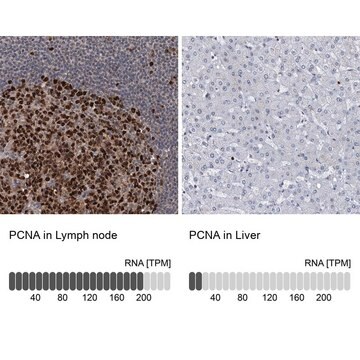추천 제품
생물학적 소스
mouse
Quality Level
항체 형태
purified from hybridoma cell culture
항체 생산 유형
primary antibodies
클론
PC 10, monoclonal
양식
buffered aqueous solution
분자량
antigen ~36 kDa
종 반응성
monkey, rat, insect, mouse, yeast, human
농도
~1.0 mg/mL
기술
ELISA: suitable
flow cytometry: suitable
immunoblotting: 0.5-1 μg/mL using human foreskin fibroblast HS-68 cell line extract
immunofluorescence: 1.25-2.5 μg/mL using HeLa cells
immunohistochemistry: 10 μg/mL using heat-retrieved formalin-fixed, paraffin-embedded human Tonsil sections.
immunoprecipitation (IP): suitable
동형
IgG2a
UniProt 수납 번호
배송 상태
dry ice
저장 온도
−20°C
타겟 번역 후 변형
unmodified
유전자 정보
human ... PCNA(5111)
일반 설명
Anti-Proliferating Cell Nuclear Antigen antibody (mouse IgG2a isotype) is derived from the PC 10 hybridoma produced by the fusion of mouse myeloma cells and splenocytes from a BALB/c mouse. PCNA is an auxiliary protein of DNA polymerase δ and belongs to the conserved sliding clamp family of proteins.
PCNA (proliferating cell nuclear antigen) gene is mapped in human chromosome 20p12.3. PCNA is a homotrimeric protein, which is expressed in the nucleus. The PCNA ring has a large central cavity that allows double-stranded DNA to slide freely along it.
특이성
Monoclonal Anti-Proliferating Cell Nuclear Antigen (PCNA) specifically recognizes Proliferating Cell Nuclear Antigen from human, monkey, rat, mouse, insect and yeast origin.
면역원
PCNA-Protein A fusion protein.
애플리케이션
Anti-Proliferating Cell Nuclear Antigen antibody, Mouse monoclonal may be used in:
- enzyme-linked immunosorbent assay (ELISA)
- immunoblotting
- flow cytometry
- immunohistochemistry
- immunoprecipitation
- immunofluorescence
생화학적/생리학적 작용
PCNA (proliferating cell nuclear antigen) maintains the polymerase and DNA association by forming a sliding clamp and ensures efficient DNA replication. PCNA is responsible for recruiting important regulatory factors for DNA damage tolerance mechanism. In response to UV irradiation-induced DNA damage, monoubiquitination of PCNA mediates the polymerase switching model by recruiting DNA polymerase η to PCNA. The protein is involved in base excision repair and maintains genome stability. PCNA is associated with proteolysis coupled to DNA synthesis and repair for proper cell cycle progression.
PCNA protein is essential for chromosomal DNA replication during S-phase and is required for several DNA processes like DNA repair, sister chromatid cohesion and cell cycle control. This protein is also involved in the epigenetic modification and chromatin assembly and remodeling. PCNA acts as a prognostic and diagnostic marker in several diseases such as breast cancer, chronic lymphoid leukemia, non-Hodgkin′s lymphoma, malignant and nonmalignant skin diseases and systemic lupus erythematosus.
물리적 형태
Solution in 0.01 M phosphate buffered saline, pH 7.4, containing 15 mM sodium azide.
저장 및 안정성
For continuous use, store at 2-8°C for up to one month. For extended storage, freeze in working aliquots. Repeated freezing and thawing is not recommended. If slight turbidity occurs upon prolonged storage, clarify the solution by centrifugation before use. Working dilution samples should be discarded if not used within 12 hours.
면책조항
Unless otherwise stated in our catalog or other company documentation accompanying the product(s), our products are intended for research use only and are not to be used for any other purpose, which includes but is not limited to, unauthorized commercial uses, in vitro diagnostic uses, ex vivo or in vivo therapeutic uses or any type of consumption or application to humans or animals.
적합한 제품을 찾을 수 없으신가요?
당사의 제품 선택기 도구.을(를) 시도해 보세요.
Storage Class Code
10 - Combustible liquids
Flash Point (°F)
Not applicable
Flash Point (°C)
Not applicable
가장 최신 버전 중 하나를 선택하세요:
Karin M Gilljam et al.
The Journal of cell biology, 186(5), 645-654 (2009-09-09)
Numerous proteins, many essential for the DNA replication machinery, interact with proliferating cell nuclear antigen (PCNA) through the PCNA-interacting peptide (PIP) sequence called the PIP box. We have previously shown that the oxidative demethylase human AlkB homologue 2 (hABH2) colocalizes
Proliferating cell nuclear antigen prevents trinucleotide repeat expansions by promoting repeat deletion and hairpin removal.
Beaver JM
DNA Repair (2016)
E J Nouwen et al.
Laboratory investigation; a journal of technical methods and pathology, 70(4), 479-493 (1994-04-01)
Little is known about the impact of acute proximal tubular injury and dysfunction on the distal nephron. Selective necrosis of the kidney proximal convoluted tubule (PCT) was induced in rats by subcutaneous injection of the aminoglycoside gentamicin during 2 days.
Shao-Chun Wang
Trends in pharmacological sciences, 35(4), 178-186 (2014-03-25)
Proliferating cell nuclear antigen (PCNA) is known as a molecular marker for proliferation given its role in replication. Three identical molecules of PCNA form a molecular sliding clamp around the DNA double helix. This provides an essential platform on which
H K Wolf et al.
The journal of histochemistry and cytochemistry : official journal of the Histochemistry Society, 40(9), 1269-1273 (1992-09-01)
We describe the effects of tissue preservation, fixation time, and hydrolytic treatment on the detection of proliferating cell nuclear antigen (PCNA) by immunoperoxidase staining with three commercial anti-PCNA antibodies (19A2, 19F4, PC10). Our goal was to provide guidelines for PCNA
자사의 과학자팀은 생명 과학, 재료 과학, 화학 합성, 크로마토그래피, 분석 및 기타 많은 영역을 포함한 모든 과학 분야에 경험이 있습니다..
고객지원팀으로 연락바랍니다.








